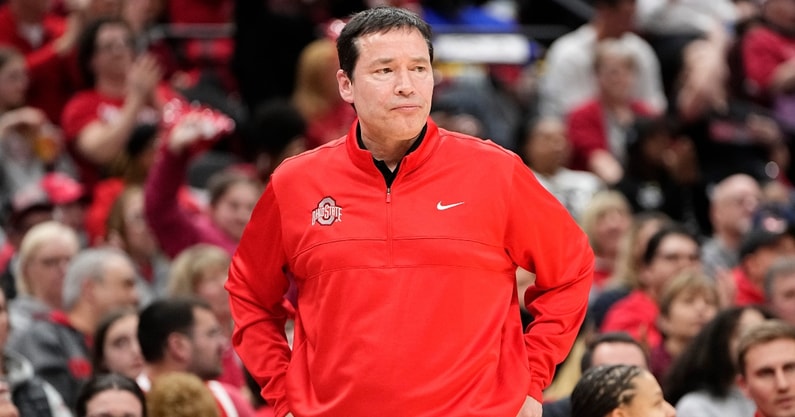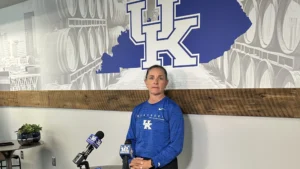
Ohio State Women’s Basketball Coach Kevin McGuff Charged with OVI: A Closer Look at the Incident and Its Impact
Ohio State University (OSU), a renowned institution that has established a legacy of excellence in both academics and athletics, was recently rocked by a high-profile incident involving Kevin McGuff, the head coach of the Ohio State Women’s Basketball team. McGuff, who has been at the helm of the Buckeyes’ women’s basketball program for several years, was charged with Operating a Vehicle Impaired (OVI) after a traffic stop in early May 2025. This event has captured widespread attention, raising important questions about the responsibilities of public figures and the potential consequences of such legal matters.
As a respected figure in the world of collegiate basketball, McGuff’s charge has led to public scrutiny, discussion of potential disciplinary actions, and considerations about the broader implications of impaired driving. In this article, we will delve into the details of the incident, explore the consequences of an OVI charge, discuss the reputation of Kevin McGuff as a coach, and examine the broader context of OVI charges in the sports world.
On the night of May 10, 2025, Kevin McGuff was involved in a traffic stop in the Columbus, Ohio, area. Authorities reported that McGuff was driving erratically, which prompted a police officer to pull him over. According to law enforcement, McGuff exhibited signs of impairment, including difficulty in speaking clearly and failing a field sobriety test. Subsequently, he was arrested and charged with Operating a Vehicle Impaired (OVI), a criminal offense in the state of Ohio.
The specifics of the incident, including the results of McGuff’s blood alcohol content (BAC) test, have not been disclosed to the public as of the latest reports. However, McGuff’s arrest has been confirmed by the Ohio State University athletic department, and a statement was issued acknowledging the incident.
“We are aware of the situation involving Coach McGuff and are fully cooperating with local authorities. At this time, we are in the process of gathering all the facts and will address the matter appropriately,” read the statement from OSU’s athletic department.
Given McGuff’s public profile as the head coach of a major university team, the news quickly spread across local and national media outlets. The charges sparked widespread discussion regarding the impact of such incidents on public figures and their organizations.
Operating a Vehicle Impaired (OVI) is a serious offense in Ohio and carries substantial penalties, even for first-time offenders. Under Ohio law, an individual can be charged with OVI if their blood alcohol concentration (BAC) is 0.08% or higher, or if they are impaired by drugs, alcohol, or any combination of the two.
The penalties for an OVI conviction in Ohio can vary based on several factors, including the individual’s prior criminal record, whether there was a child passenger in the vehicle, and whether the individual was involved in an accident while impaired. A first-time OVI offender in Ohio may face penalties such as:
- A fine ranging from $375 to $1,075
- A mandatory license suspension ranging from 6 months to 3 years
- Possible jail time, with sentences ranging from 3 days to 6 months, although many first-time offenders may serve time in a residential treatment facility instead of jail
- Probation and mandatory alcohol education programs
Repeat offenders, or individuals with high BAC levels or aggravated circumstances (such as accidents or child endangerment), face far more severe consequences. The legal system will ultimately decide McGuff’s fate, but this incident could lead to significant personal, professional, and legal consequences.
As the head coach of the Ohio State Women’s Basketball team, Kevin McGuff is a prominent public figure. His leadership has played a critical role in the team’s success in recent years, including multiple NCAA tournament appearances and a growing reputation as one of the top women’s basketball programs in the country. However, McGuff’s charge of OVI has placed his future at the university and in his role as head coach into question.
While Ohio State University has expressed its commitment to gathering all facts and cooperating with authorities, the incident could lead to disciplinary actions by the school or the NCAA. In the past, high-profile figures in collegiate sports have faced sanctions ranging from temporary suspensions to termination. While McGuff’s tenure with OSU has been largely successful, this arrest could tarnish his reputation and lead to a reassessment of his role at the university.McGuff’s arrest has not only impacted his career but has also led to a public relations challenge for Ohio State. As a major university with a rich athletic tradition, OSU holds its coaches to a high standard of behavior, both on and off the court. The incident has prompted discussions about accountability, and public figures who are entrusted with guiding young athletes. In many ways, McGuff’s leadership ability will now be scrutinized not just based on his performance as a coach but also on his personal conduct.Ohio State women’s basketball fans are divided over McGuff’s arrest. Many fans express disappointment, citing that a coach is a role model for student-athletes and the larger community. Others, however, stress the importance of giving McGuff a chance to address the situation and acknowledge that everyone is entitled to make mistakes. The reaction from the fanbase will likely continue to evolve as more details emerge about the incident.
Kevin McGuff has been instrumental in building Ohio State’s women’s basketball program into a competitive force. His tenure has seen the team win Big Ten titles and gain national recognition. The team’s success under McGuff has fostered an environment of growth, camaraderie, and excellence that extends far beyond the basketball court.
However, McGuff’s OVI charge may have ripple effects on the team and its players. In collegiate sports, athletes often form deep connections with their coaches, who serve as mentors and guides. McGuff’s arrest may lead to a sense of uncertainty among the players, especially as they navigate the public attention surrounding their program. Ohio State will likely have to ensure that the team’s focus remains on basketball and that players are not unduly affected by the media frenzy.
Coaches in collegiate athletics are not just tasked with developing players’ skills in their respective sports—they are also expected to serve as role models. This includes setting an example of good character, responsibility, and ethical conduct, both in their professional and personal lives.
McGuff’s charge of OVI brings into sharp focus the larger issue of how public figures are expected to uphold high moral standards. Coaches are responsible for mentoring young athletes, many of whom are still in the process of maturing and developing life skills. When a coach faces legal troubles, it can serve as a teachable moment for both the coach and the players.
Ohio State University and McGuff will likely use this incident to reflect on the broader responsibilities of coaches in shaping the next generation of student-athletes—not just in their sport but also in life.
McGuff’s situation is not unique. Over the years, other coaches have faced legal challenges that have cast a shadow over their careers. The response from their institutions and the public varies, but a few key lessons can be drawn from these cases:
- Immediate Transparency: In many high-profile legal cases, the best approach for organizations is to maintain transparency with the public. While protecting an individual’s privacy is essential, being open about the facts surrounding the case helps manage public perception.
- Proportional Consequences: Institutions like Ohio State have to strike a balance between holding their staff accountable and offering support when an individual makes a mistake. A coach’s track record of success and their impact on the program should be considered when determining the severity of the consequences.
- Educational Opportunities: Legal troubles often provide an opportunity for growth and education. Many coaches who have faced charges have used their experiences to help mentor young athletes about the dangers of impaired driving and the importance of responsible behavior.
As the legal process moves forward, the future of Kevin McGuff at Ohio State will depend on a variety of factors, including the outcome of the court case, his level of cooperation with the university, and his ability to rebuild his reputation. McGuff may also face disciplinary action from the university or the NCAA, depending on the severity of the charges.
Ohio State University will likely continue to support the women’s basketball program and its student-athletes, regardless of the outcome of McGuff’s case. Whether McGuff remains as head coach or is replaced, the university will have to ensure that the program’s success is not derailed by this incident.
In the meantime, McGuff’s leadership and commitment to rectifying the situation will play a crucial role in determining how he is perceived both within the athletic community and by the public.
Kevin McGuff’s arrest for OVI has undoubtedly shaken Ohio State University and the broader world of collegiate sports. As the legal process unfolds, McGuff’s case serves as a reminder of the responsibilities that come with being a public figure and a role model to young athletes. Whether McGuff ultimately remains the coach of Ohio State’s women’s basketball team or moves on to other opportunities, this incident will likely serve as a pivotal moment in his career—one that will require both personal reflection and professional growth.
In the coming months, the public’s reaction, the university’s response, and McGuff’s ability to address the situation head-on will play a significant role in shaping his future and the legacy he leaves behind at Ohio State.





